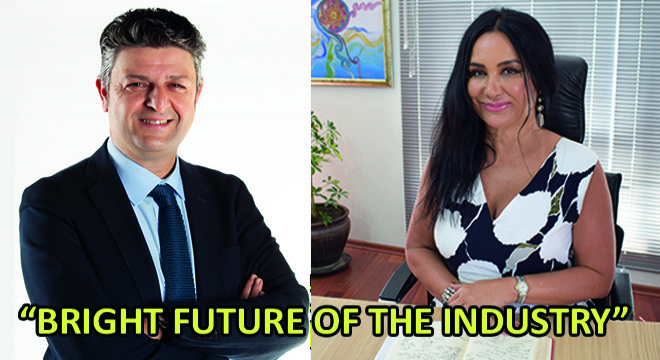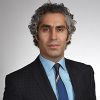
Erdin Erengül, Deputy General Manager of Mars Logistics Railway;
“THE INDUSTRY IS INNOVATIVE AND OPEN TO DEVELOPMENT”
Drawing attention to sustainable logistics, Erengül said the following about the logistics sector: “The future of the sector is bright, innovative and open to development.” You can read the details in our news.
Mentioning Mars Logistics as one of the pioneers and former players of the sector, Erengül stated the details of the company, which was established in Istanbul in 1989, as follows: “Mars Logistics started with forwarding and then continued to grow with the inclusion of self-owned vehicles in the fleet. In 1994, it moved to our previous address in Yenibosna. Vehicle investment and fleet has grown to what it is today. Later, it added warehouses, air cargo company and sea cargo company to its structure. Mars Logistics is fully focused on international transportation with 2,650 self-owned vehicles. However, we can say that it is a pioneering company that incorporates all activities in the logistics chain, such as warehousing and domestic distribution, which are complementary to international transportation. We work mainly in Europe, mainly in Western and Eastern Europe. Mars Logistics is a group of many companies. We also have an air cargo company that provides air and sea transportation. Besides, we have an insurance company where we insure our own cargo and property. We also have a company in Spain and Luxembourg. Our goal is to further increase our activity here.”
“Price Performance Criteria Will Become Even More Important”
Emphasizing the importance of logistics by stating that the product produced has no value if the produced product cannot be transported from one place to another, no matter how much it is produced, Erengül said that; “The priority here is to provide reliable service. In other words, it is necessary to establish a correct balance in the price-performance ratio, which brings out the economy of the business. When we look at the upcoming period, we think that this price performance criterion will become even more important. Because, if we leave aside the energy imports, Turkey's economy is completely export-oriented. Industry stakeholders mention that exports are very intense at the moment and that there are load deficiencies or imbalances in imports. Therefore, in order to support our exporters, we need to be in the right place in terms of price-quality performance, and here, intermodal comes into play.”
“A Sustainable Shipping Method”
Erengül mentioned the importance of intermodal transportation for a sustainable logistics and stated that Turkey got used to intermodal transportation and said that; “UNRORO, which was established during the disintegration of Yugoslavia, has now become DFDS. At that time, the first seeds of intermodal transportation were planted. From here we were putting our vehicles on the ships and taking them to Trieste. We used to tie up our tow trucks in Trieste, and on the way back, we would pick up the products and bring them back to Trieste, load our trailers on the ship and pick them up from Istanbul. Now, instead of taking the tractors to Trieste, we go to certain points by trains from Trieste, our tractors are waiting there. This brings with it a sustainable service. It becomes more manageable as you will be in traffic for a short time. Fuel is a very important input, here, too, some advantages come into play. A transportation method that is both cost-effective and sustainable in terms of performance. We are now the next phase of this; 'How can we send our vehicles to the nearest station to the destination!' we analyze them. This is important when we look at the role we play in international trade. As Mars, we manage this well.”
“Drivers Always Have Problems With Visa”
Stating that one of the reasons why they turned to intermodal solutions was the artificial walls placed in front of them, Erengül gave the example of the sudden increase in freight rates with the Hungarian dose volatile ending last year, and said that; “Hungary is closer than going somewhere in the country, but the drivers could not go. Drivers always have problems with visa. Of course, these problems existed before the pandemic. We focused ourselves on how to send the product without touching the load as much as possible. Our intermodal flights over Trieste are the solution.”
“What Is Important Is How Much The Authority Has Improved Our Infrastructure According To The Need Of The Sector”
Erengül, who stated that they have been making trips to Germany to carry containers from Turkey since 2016, spoke about the new line launched from Halkalı to the Czech Republic. Mentioning the problems experienced at the infrastructure and border gate, Erengül said that; “We load the freight from Halkalı and pick it up from Germany 5 days later. Now we have a new line from Halkalı to the Czech Republic. There are no more worries regarding visa, dozvola. What is important here is how much the authority has developed our infrastructure according to the needs of the sector. For example, we are leaving Halkalı and its infrastructure was established in 1970 and has survived since then. It needs to be modernized. Although we take the ferry over Pendik as the main line, we still have vehicles going by land. These vehicles will be installed in Kapıkule. It doesn't end after passing there, if this whole fleet is passing through Romania, there is a queue there too. Therefore, we need to solve this with different methods. The blockades of Europe to stop us will not end. Maybe because we are constantly mobile, our industry adapts to development relatively easily. We need to find solutions against it. We should be developing different methods such as intermodal.”
“Existing Infrastructure Does Not Have Appropriate Geometry; It Needs to be Restored”
Noting that railway investments have increased recently, Erengül pointed out that the railway has a significant share in the budget of the Ministry of Transport, but that share is reserved for passengers, not freight. Erengül made the following evaluations: “We are building high-speed train lines, when high-speed train lines come into operation, the existing conventional lines will be allocated more for freight. Therefore, this will have a positive contribution to freight transportation.' argument is presented. However, this is not the case for domestic rail transport. Because the existing infrastructure does not have the appropriate geometry, it needs to be restored. The share of railway in transportation is 1 percent. When we look at Europe, the rate of freight transportation by rail is 25 percent. They encourage this and apply serious suspensions. We should be implementing similar structures within ourselves. In the first years of the Republic, serious infrastructure investments were made until the beginning of World War II. From that period to the beginning of the 2000s, no investments were made. When we look at it from 2002 to the present, the investments made are mostly passenger-oriented. It is necessary to look at these investments a little more load-oriented. State railways in Europe earn from freight and spend it on passengers. A revolutionary perspective is required at this point. Our highways are very good, there are no problems, but the important thing here is sustainability.”
“Our Goal Is To Bring This To The International Dimension”
Making evaluations about MilkRun, one of Mars Logistics' domestic operations, Erengül stated that this transportation operation is a structure they generally apply for the automotive industry and said that; “We provide the MilkRun system for 51 percent of the current automotive production. In other words, I can explain MilkRun as taking the part needed in production from the supplier and shipping it at the desired time in production. We have serious IP investments related to this. By using our own infrastructure, we get confirmation of which part the suppliers will produce and when, and share them with the main industry, and we connect the two, and we leave as many products as needed at any time. This is one of our serious domestic operations. Our goal is to bring this to an international dimension.”
“If You Don't Grow And Stay Where You Are, You Will Fall”
Erengül states that there are already 165 thousand square meters of warehouses in Turkey and investments are increasing in line with the needs. Emphasizing that they make some renewals in the fleet every year, however, the investments continue to change the old vehicles and expand the fleet, Erengül said in his speech that; “Last year, we made an investment of around 15 million euros. We foresee an investment in this area for 2021 as well. We continue our investments by chasing opportunities to see if we can invest in slightly different areas, the railway. We are investing in vehicles in our company in Spain. Investment is important; because if you don't grow and stay where you are, you will fall. Although we seem to be competing with domestic companies, we are actually in competition with foreign companies. However, we can compete with them by growing and these investments will continue. Our turnover last year was 2.3 billion liras. We grew by over 10%. We anticipate 10 percent growth this year as well.
“An Innovative and Developmental Sector”
Referring to the problems faced by Turkish transporters in Europe, he said that; "They are building a wall for us, so we focus on how we can create an alternative order by removing that wall, and we succeed in this." Regarding sustainability, Erengül said that; “The future of the sector is bright, innovative and open to development. One of the best fleets in Europe belongs to Turkey. I foresee that we are open. Is this guaranteed? This is where sustainability comes into play. We should look at how we can achieve this. We do not only do intermodal transportation in terms of sustainability. We have solar power plants above our warehouses. We have an infrastructure that harvests rainwater and a waste separation system in all our facilities. We anticipate what comes before us and focus on how we can find an alternative.
We Expect the State to Provide the Necessary Infrastructure”
Pointing out that when logistics performance is increased, it will also increase economic development, Erengül said that; “Turkey ranks 17th in terms of economic development. When we look at the Logistics Performance Index, it ranks 40th. In Turkey, the scissors open in reverse. If we can increase the logistics performance, we will be able to carry the economic development even higher. Only the sector cannot do this. At this point, we expect the state to provide the necessary infrastructure. They keep the consultation channel open as much as possible. I am sure we will achieve this together.”
 Küfür, hakaret içeren; dil, din, ırk ayrımı yapan; yasalara aykırı ifade ve beyanda bulunan ve tamamı büyük harflerle yazılan yorumlar yayınlanmayacaktır. Neleri kabul ediyorum: IP adresimin kaydedileceğini, adli makamlarca istenmesi durumunda ip adresimin yetkililerle paylaşılacağını, yazılan yorumların sorumluluğunun tarafıma ait olduğunu, yazımın, yetkililerce, fikrim sorulmaksızın yayından kaldırılabileceğini bu siteye girdiğim andan itibaren kabul etmiş sayılırım. |
|
 |
|
 |
|
||||||||||||||||||
|
 |
|
 |
|
||||||||||||||||||
|
 |
|
 |
|
||||||||||||||||||





